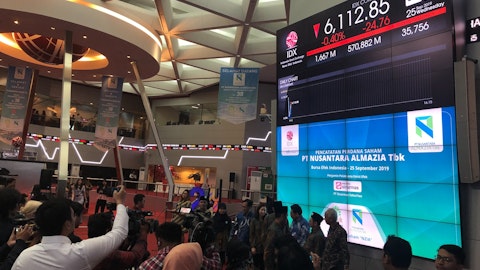But again, it’s uncertain — and our uncertain tax position really reflects that uncertainty. So I can’t give you specific one way or the other in terms of IRS positions because we just don’t know as of yet. But I can tell you, we spent a lot of time researching this, a lot of time discussing it, deliberating it internally, and we think the position that we’ve come out is the right position.
Operator: And next, we’ll go to Rob Stallard with Vertical Research. Please go ahead.
Robert Stallard: Thanks so much. Good morning. Jay, a boring inflation question for you. Are you seeing any signs that inflation is starting to ease as it works itself through your system? Or was there any mitigation for this cost inflation that is going to be flowing through from the final FY ’23 budget resolution?
Jay Malave: Yes. Rob, inflation is something that we evaluate all the time. In many of our existing contracts, we have not really seen a significant impact, only because I mean our fixed price contracts — our suppliers are under fixed price contracts with us. Where we have seen is really on new proposals is where we’ve seen some impacts, where you’ve got suppliers unwilling to provide longer-term price commitments requesting what we refer to in the industry as economic price adjustments, which are escalation clauses, inflation clauses. And those are ongoing dialogues that we have with our customers as well. And so it’s still an ongoing issue. To be honest with you, on the proposal side, we really haven’t seen any type of reduction there in the pressure.
It’s something that we review quite often on these new proposals, and it’s something that we grapple with because either you have to price in some type of inflation assumption into your proposal or you have to have some type of back-to-back agreement where you’re going to have an inflation clause. And we’re getting squeezed with our customer as well as with our suppliers, and we’re trying to make sure that we can accommodate both requirements here.
Operator: Our next question is from Ken Herbert with RBC Capital Markets. Please go ahead.
KenHerbert: Hi, good morning, Jim and Jay. Just wanted to ask a question here on the new award outlook. Putting FARA aside, if you look at NGI, maybe NGAD and other opportunities, what’s the current expectations for timing around some awards, specifically around NGI? And are there other programs out there on the new award side that could significantly move the needle as we think about sort of the potential impact into ’24?
Jay Malave: You think about a few of these, it’s something that we have — I mean you know that the F-35, so we’ve got waiting for the — we’re expecting the production order on Lot 17 in 2023. We do have a large missile — air and missile defense program — international program. It’s an important program for us this year. And so it’s probably back half of the year type of decision. That is included in our four pillars of growth when we talk about new awards. There are other programs here that are classified, really can’t get into kind of the detail of those, but we expect some of those awards to be made either at the tail end of this year or into next year as well. And in NGI, we would expect to down-select around 2025. And so there’s a fair amount of markers out there in some of these programs that I just spoke between now, really in 2025, that certainly are important to us. Jim mentioned FARA. That’s probably a 2025 decision as well.
Operator: Next, we’ll go to Sheila Kahyaoglu with Jefferies. Please go ahead.





